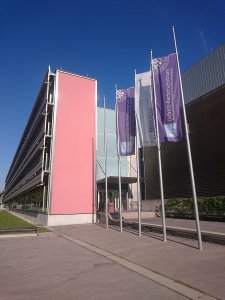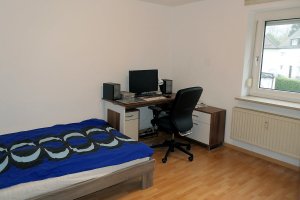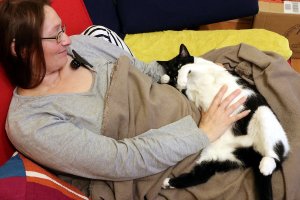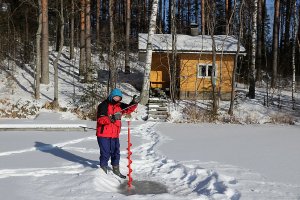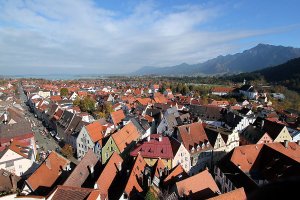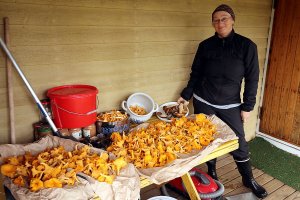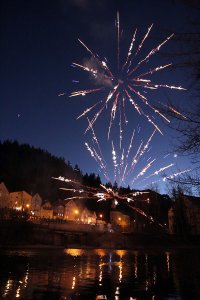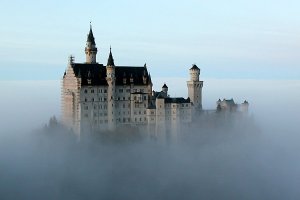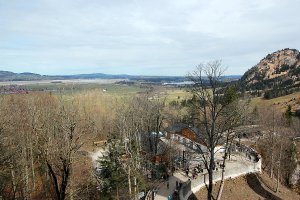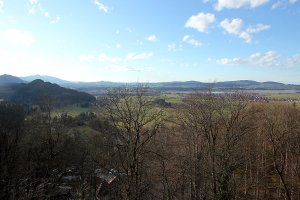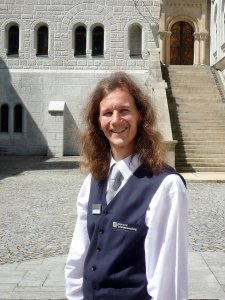Arto's Blog
New job, new city, new hobbies
Posted: 2019-11-28 23:57:00, Categories: General, Work, Germany, 1082 words (permalink)Since April I've been working three days a week at the Leibniz Supercomputing Centre (LRZ) in Garching near Munich. It's great to have colleagues around and a physical office again instead of doing freelance work at home over the Internet. I also enjoy having convenient access to city life again.
My main home is still together with Sandra in Halblech near Füssen at the border of the Alps. It's a region blessed with a lot of natural beauty, but having spent most of my life in Helsinki I was missing having a larger city at least nearby. That was my main reason of searching for a new employment in Munich instead of Füssen or surroundings. Now I have a place to stay in both.
LRZ is in many ways similar to CSC, my long-time employer in Finland. It provides network, scientific computing and data services for all Munich universities as well as for other research organizations in Bavaria. The current flagship supercomputer is the most powerful in whole Europe, which makes LRZ one of the top three centers in Germany and plays a role in attracting talented people. Like at CSC, the goal is to provide stable and reliable services which researchers can depend on, but experimenting with new technologies is encouraged and the time perspective of development projects reaches further than just a few months ahead.
I'm part of the web team which provides web hosting services for the universities. My main responsibility is the administration and development of the LRZ GitLab service, a distributed version control system for source code and other files. I can put my Linux system administration skills in real use again, as well as learn new concepts of modern software development. Compared to the long term preservation planning I was involved with for almost ten years, it's more hand-on technical work which suits me well.
My contract is 20 hours a week which I normally divide between three days from Wednesday until Friday. That leaves half of the week for other activities and spending time together with Sandra. I left my job as a guide at the Neuschwanstein castle after two eight month seasons but continue to offer guided tours and walks in the town of Füssen and surroundings. I started that three years ago and Sandra also recently joined the team so we are now both official guides in the area. That's refreshingly different than sitting in front of the computer, keeps my language skills alive and has been a great opportunity to learn more about the region. Occasionally I also bring travel groups to Neuschwanstein and meet my ex-colleagues there.
Travelling from Halblech to Munich by public transport takes about two and a half hours one way — far too long for commuting daily back and forth but perfectly acceptable to do once a week. Immediately after getting confirmation of my new employment I started searching for a place to stay. Knowing that Munich is the most expensive city in Germany, I prepared myself for a lengthy search with a backup option of booking Airbnb or guesthouse rooms during the first weeks.
At times one needs luck in life, and in my search I certainly had some. Only after a couple of weeks I got offered a spaceous and very reasonably priced room in the Freimann district, right in the middle between the city center and Garching where LRZ is located. We are seven people sharing a house which might sound like many, but as four of us are in Munich only part-time it has never been too tight in the large kitchen and two bathrooms we share. We have a large sunny terrace for enjoying a drink or grilling together on summer evenings, less than 15 minutes by foot to the English garden and the Isar river, plus a direct subway line both to Munich city center and to Garching. My room is equipped with a double bed so Sandra is also welcome to come and stay overnight whenever she wants, but she mostly prefers to avoid the city. As readers knowing me might guess, I usually move around by bicycle. Munich is not perfect for cycling, but especially along the Isar is a good route without any traffic lights. I have about 11 km to work and the city center is about 10 km in the opposite direction. During warm summer days I usually packed a towel and jumped into the river for a short swim on the way back from work. And when I want to enjoy some live music in the evening, I can get to the popular venues mostly within half an hour either by bike or by subway depending on which I feel like using. In a way my life is now divided in two. At home I have Sandra, a cat again (more about that another time in a separate article), the friends we've made during the last few years, my tourist guide activities plus of course the nature with mountains, lakes and abundant hiking trails. Munich offers me the new IT work with opportunities to develop myself professionally, nice colleagues and the activities of a major city. It's a good combination in many ways, sort of the best of both worlds.I also have a couple of new hobbies which are at the same time fun and healthy. Contact improvisation is a kind of playful dancing without choreography, which I started doing about two years ago. Lately I've become enthusiastic about Acroyoga, a combination of yoga and acrobatics with a bit of Thai massage thrown in the mix. I gave it a try in August, was hooked and found a beginner-friendly group which gathers regularly every Wednesday evening. The exercises are challenging but not competitive so people with different skill levels can be in the same class and support each other. Acroyoga isn't going to replace my classic hatha yoga practise but complements it with new interesting elements.
If you can read German (or just want to see a few photos), this article describes the typical content of an acroyoga evening and also my thoughts about it quite well. Both contact improvisation and acroyoga are practised together with a partner or in small groups and rely on mutual trust between the participants. Partners are chosen new every time and especially in contact improvisation even changed several times during the evening. That makes every session different and creates a beautiful community spirit in the group.
Happy Holidays
Posted: 2018-12-24 00:18:00, Categories: Travel, General, Work, Austria, Slovenia, Germany, Hiking, 757 words (permalink)Sandra and I would like to wish you all a happy holiday season during the end of the year and all the best for the New Year 2019! Here's our traditional Season's greetings card. This year I've been lazy to write in the blog, so I'll use this opportunity to briefly look back on what we've been up to in 2018.
I spent a good part of the winter and spring in Helsinki, enjoying the city life as well as combining it with some IT work and other projects. Sandra stayed mostly at home in Germany but came to Finland for a couple of weeks in February and March. Together we spent a few winter days at my father's cottage by the lake Saimaa, cross-country skiing, having sauna and testing the new fireplace which was installed during the previous summer. We both work part-time, which gives us quite a bit of flexibility in planning our schedules. Sandra is employed as a laboratory technician and I started in 2017 a new activity as a city guide in Füssen, the nearest town. That's a great opportunity to use my language skills and do a variety of different tours which I've enjoyed quite a lot. This year I wasn't employed at the Neuschwanstein Castle any more. It was a good experience and I could consider working there again in the future but two seasons was a good amount for now. Our main holiday tour in the summer was a three and a half week hike over the Alps in July-August, starting from Lake Königssee in Germany and ending with a crossing of the Triglav National Park in Slovenia. We crossed the Alps on foot once before in 2010, but this was a quite different route. It was based on the route described in the hiking book Salzburg - Trieste by Christof Herrmann, but we adapted it according to weather and our preferences along the way. The first part of our hike took us through the Berchtesgaden National Park, which is well known for its limestone rock formations. Then we continued over several mountain ranges in Austria, including parts of the Hohe Tauern National Park and the Kreuzeck Group. The Kreuzeck mountains turned out to be one of our favourite sections of the trip, with classic alpine views of rocky peaks, grassy fields, pittoresque lakes, small mountain huts and quite a few animals including marmots. After Austria we walked shortly on Italian soil before entering Slovenia and the Julian Alps. There we had plenty of more limestone rock and the most demanding sections of our trip, not only because of the rough terrain but also because of the heat. The whole central Europe was experiencing a heat wave and although the temperatures up in 2000 meters of altitude were a bit cooler than in the valleys, it still got pretty hot both during the days and in the fully packed dormitories of the mountain huts at night.Our highlights in the Julian Alps included sightings of majestic capricorns at close range and admiring the Edelweiss flowers blooming in large numbers. In most other parts of the Alps they've almost disappeared and we hadn't seen one for many years.
In addition to the walk over the Alps, we were quite a bit on the trails this year, including two nice hikes near Innsbruck. Our good friend Peter lives there, is often willing to join us in our outdoor activities and it's always a pleasure to visit him. On our last visit we also went together to a concert by Eivør, which we can definitely recommend!
In September we visited Finland again, which was a perfect timing for the mushroom season. We have never picked so many chantarelles, boletes and black trumpet mushrooms in two weeks. It was a challenge to conserve and bring even about half of the catch with us to Germany. One of our favourite dishes is potato dumplings with mushroom sauce, which we've been preparing quite often during the last few months.This year we'll spend the Christmas Eve with the family of Sandra's old friends who live in a village about 30 km from us. They have two children and the grandparents will be joining as well, so it'll probably be the most traditional Christmas we'd had for years. For the New Year my parents and both of my brothers will come for a visit. We're looking forward to that, mostly we meet in Helsinki and my youngest brother Lari who lives in Canada we're anyway not seeing very often.
A job with a royal view
Posted: 2016-07-03 01:47:00, Categories: Travel, Work, Germany, 878 words (permalink)Since March 2016 I've been working part-time as a guide at the Neuschwanstein castle, one of the most popular tourist attractions in Germany. It has been a great experience to do something completely different than my previous jobs, and the view out of the "office" windows is the best I've ever had. :-) In addition to greeting thousands of visitors from around the world, through the work I've gotten to know many nice colleagues, some even from the same village we are living in.
The castle is located a good 10 km from our apartment, on top of a hill so we actually see it from our windows. It takes me about 50 minutes to cycle there and change my clothes to the official outfit of the guides. I work normally on Mondays and Wednesdays, starting at 8, 9 or 10 in the morning, and finishing between 16:30 and 19 in the evening. During July-September I'll be there one more day per week, usually Thursdays. Additionally I'm still involved in IT projects on a freelance basis, so this year has been busier than usual.
With more than a million visitors per year Neuschwanstein is the top tourist magnet of the area. All visits of the castle are guided tours, which guarantees that there is enough to do. During the busiest time of the day, a new tour with up to 60 participants starts every 5 minutes. Every guide on duty does up to 10 tours a day, lasting about half an hour each. After the tour there's some time for answering questions, coming back to the starting point and preparing for the next tour, usually also for a short break in between. The tours come in three varieties: spoken tours in English and German, plus audio tours where each visitor gets a portable device and can choose the language from 18 alternatives. On an audio tour, the job of the guide is to lead the group through the castle, activate the audio guides at pre-defined points and help in case of any problems. That gives occasionally a chance to practise other languages than English and German. In addition to the tours, the guides are also responsible of cleaning the exhibition rooms. That's done every morning before the first tour starts. A world famous attraction brings in an international audience. One clearly visible trend is the rise of Chinese tourism: without any statistics in hand I'd guess that Chinese are already the second largest group of visitors right after Germans. Also other Asian countries, Northern America and large European countries such as France, Italy and Spain are well represented. Russians and East Europeans come often as well, and occasionally we receive South Americans too. Africans and Middle Eastern visitors are a rarity, even with Arabic offered as one of the languages on audio guide tours. A few times I've also met Finns in the castle. Neuschwanstein has more visitors and longer opening hours during the summer than in winter. Therefore they search guides for the summer season every year to complement the permanent staff, and that's how I also found the job. There is a range of different contracts available: full time, part time and a fixed number of days during the season, which suits especially students working during university holidays. I'm one of the three foreigners, the other two being Fabienne from France and Vladi from Slovakia. There are no dedicated English and German guides, we all do spoken tours in both languages as well as audio tours. My German isn't perfect, but being allowed to guide natives at one of the landmarks of Bavaria confirms that it's good enough.My contract is until the middle of November, a couple of weeks into the more quiet winter season. That means that I'll spend this summer and autumn mostly in Germany. One of my free time plans is to visit some other castles and palaces in the region. As an employee in one of the historic buildings managed by the state of Bavaria, there are quite a few others I have free entrance to.
The title photo shows Neuschwanstein five years ago, with the valley behind covered in fog, when I was visiting the area with my family. That was a magical moment, doing justice to the nickname "Märchenschloss", the fairytale castle. The other photos have been taken in spring 2016, featuring the view out of the windows of the guides' lounge, me at the castle courtyard and another view of the castle taken near the Marienbrücke bridge. The bridge is currently closed but should open again in August.Finally, a tip for everybody who'd like to visit the castle, especially on a summer weekend: come early in the morning. The first tour starts at 9 am, but the ticket center opens already at 8. Later in the morning you'll have to stand in the queue for quite a while, and in the afternoon all tickets for the day might even be sold out. Alternatively you can make a reservation in advance — there's a separate line to pick up pre-booked tickets. If you have a long waiting time before the beginning of the tour, a pleasant way to spend that is to take a walk along the shore of the nearby Alpsee lake.
Mountain view at home and other changes in life
Posted: 2012-06-21 12:09:54, Categories: Travel, Work, Germany, Hiking, 469 words (permalink)
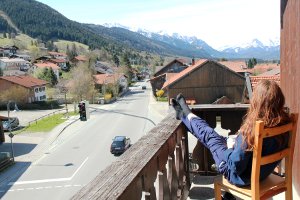 In our new home in Halblech in Southern Germany, we have a direct view
to the Alps. We moved here in the end of April after Sandra sold her
food store. I quit my job at the same time, so we're both now free to
move around and start any new projects we get excited about.
In our new home in Halblech in Southern Germany, we have a direct view
to the Alps. We moved here in the end of April after Sandra sold her
food store. I quit my job at the same time, so we're both now free to
move around and start any new projects we get excited about.
The changes had been in preparation already for some time. Like most small entrepreneurs, Sandra had endured stress and long working days for many years, and felt she needed a longer break. One of her employees was quite interested in taking over — a perfect opportunity to give her the chance of running the shop instead of a much harder decision of shutting it down.
I had continued working for CSC from home after moving to Germany. From a technical point of view it worked quite well, my employer had a positive attitude and I was able to make useful contributions to the projects. However, during one and a half years the lack of social contacts became more and more evident. I was more motivated to study German or help out with simple tasks at Sandra's shop than to work alone on a technical document in the corner of the living room. Therefore it was eventually not a hard decision to call an end to it.
The nature around Halblech is beautiful. On the east and south side are the Alps with high peaks up to 2000 meters and a large network of hiking and cycling trails. Towards the west and north are hills covered by meadows and forests, with rivers and lakes in between. I hadn't thought about it before, but a location at the foot of the mountains offers more varied scenery and opportunities for outdoor activities than a place deeper in a valley between high mountains would.
During the first weeks after moving in we didn't have to think about what to do with our additional free time. On sunny days we explored the nearby hiking and cycling trails, otherwise arranging things at home kept us busy enough. Building the kitchen was the largest amount of work.
In Germany it's common that apartments don't have any equipment in the kitchen: there are only connections for water and electricity. So we packed all our kitchen appliances, cupboards and the sink in the moving van, transported them to our new flat and reinstalled them there. That was already the second time within one year, including a new variety of small surprises during installation. In any case, after all the planning, cutting, drilling, screwing and sweating we have a functional and quite nice looking kitchen. And if we continue moving often, we'll do it faster and better each time. :)
Now it's time to enjoy the summer - and to have a housewarming party next week!
From library to library on two wheels
Posted: 2011-06-18 14:55:49, Categories: Travel, Work, Ecology, Cycling, Germany, Cyc4lib, Denmark, 641 words (permalink)
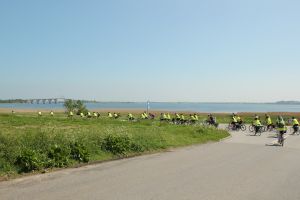 The Cycling for Libraries
tour was an experiment on what comes up in the minds of library
professionals when they go out and ride bicycles for nine days
together. Answer: far-reaching discussions about the future of
libraries in the changing world, and a great team spirit as the group
worked it's way 700 km from Copenhagen to Berlin.
The Cycling for Libraries
tour was an experiment on what comes up in the minds of library
professionals when they go out and ride bicycles for nine days
together. Answer: far-reaching discussions about the future of
libraries in the changing world, and a great team spirit as the group
worked it's way 700 km from Copenhagen to Berlin.
In the beginning we got to know each other and figured out by trial and error how to travel in a group. We saw beautiful Danish seaside landscapes, enjoyed meals prepared for us by our cook, were warmly welcomed in a local libraries, spent much more time on the road that the organizers had expected, got tired fixing punctured tyres in the rain, felt the bliss of a hot shower and slept side by side on the floor in a school.
After a couple of days the weather became more sunny, daily distances a bit shorter, bicycles were in better shape and also other topics than cycling and survival started to pop up in the discussions. As we didn't have books, documents or Internet in front of us, it was easier to think of broader topics than details. We talked about our projects, library politics, online presense and social changes — and of course about cycling, traveling and other hobbies.
The organizers had prepared for each day a theme, which was announced in the morning briefing. That guided the discussions a little bit, but ultimately it was up to each participant if they wanted to follow the theme, pick some other topic or simply listen to the nature and enjoy cycling. In the evening we were usually too tired and at the same time excited about what had happened during the day, that it was not easy to focus on any common theme other than food, beer and sleep.
A topic I found particularly interesting was the role of libraries as participants in social and environmental issues. One idea which came up was to create a global warming information finding aid: a shelf containing books, dvds and other resources on the topic, including hints what people can do themselves in everyday life. Libraries taking part in the campaign would place the shelf in a prominent place where visitors would easily see it. Different viewpoints should be offered to maintain the reputation of libraries as an impartial and trusted source of information.
Just as media can influence the thoughts and focus of its audience by choosing the topics to write about, libraries have more subtle but similar power through choosing which books and other resources are most visibly presented - including recommendations given by librarians online. Whether or not and how that power should be used is naturally not a trivial question. In any case, libraries can provide resources which give both a broader view and go deeper than a single TV show or newspaper article ever will.
One goal of the trip was to get library folks outdoors and challenge them. Several participants were first time taking part on a longer cycling tour. Accommodation was modest so people were together also in the evenings instead of locking themselves in hotel rooms. Day by day the team spirit grew, people helped each other and made sure nobody got lost or left behind. Everybody made it until the end, and many wrote afterwards that in their minds they were still cycling several days after the trip.
The Kirjastokaista team with their video cameras were with us during the whole tour. Almost everything was therefore freshly documented in detail and a short video of each day's events was posted online every evening. In that way the tour itself was an example of rapid information sharing using modern channels. A half an hour documentary is planned to come out later in the autumn. I'm looking forward to watching it.

Copyright Arto Teräs <ajt@iki.fi>, licensed under the Creative Commons Attribution-Share Alike 3.0 Unported License. (Unless otherwise mentioned in individual photos or other content.)
